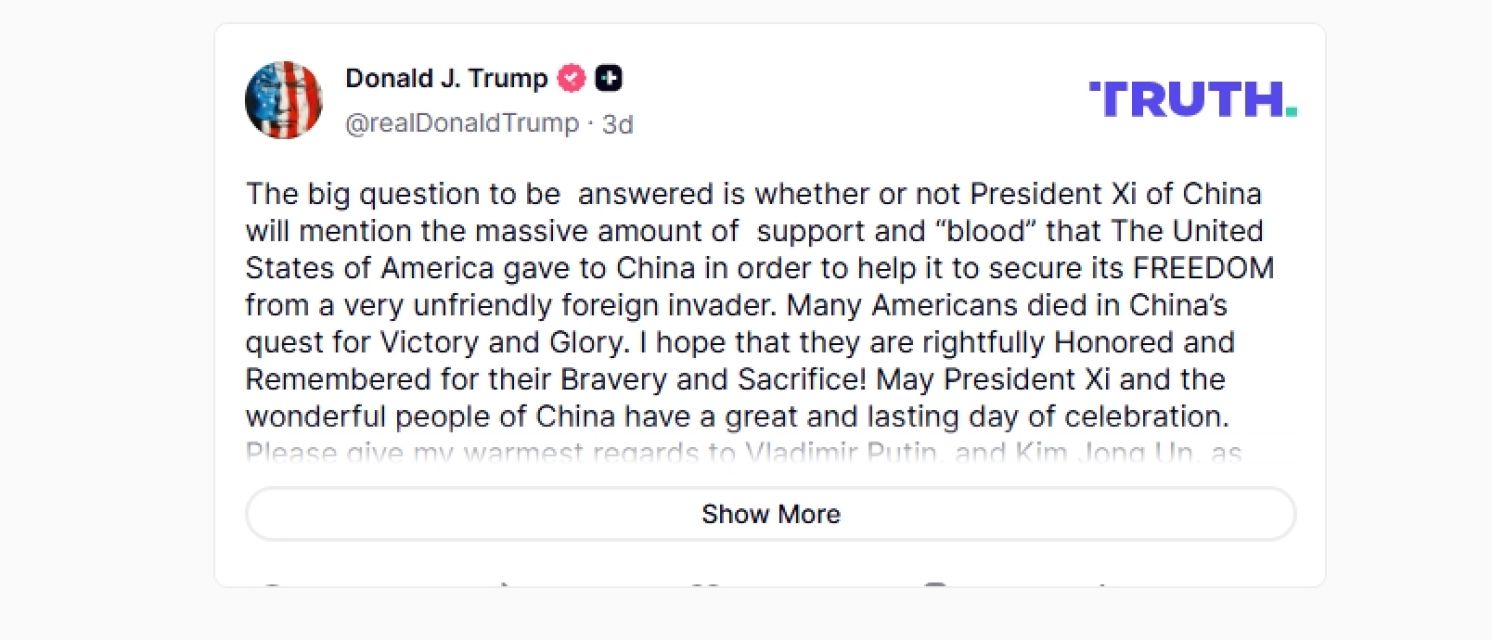
Trump Claims Credit for Allied Victory in WWII, President Lai Behaves as if Representing Defeated Nation
United Daily News Commentary, September 4, 2025
President Lai Ching-te avoided discussion of the Second Sino-Japanese War for more than half a year, effectively ceding narrative control to Chinese President Xi Jinping, and only awkwardly made it past the 80th anniversary of the September 3 Victory Day. But when the United States also sought to highlight its contribution to the war effort, the contrast made President Lai’s silence appear even more absurd, as though he were taking the stance of a defeated power.
During large-scale military parade on September 3 in Beijing presided by Mr. Xi, President Donald Trump of the United States posted on social media, criticizing Mr. Xi, Russian President Vladimir Putin, and North Korean leader Kim Jong Un for “plotting against America.” More importantly, Mr. Trump reminded Mr. Xi that the United States had provided enormous support and “blood” during the war, with many Americans sacrificing their lives for China’s victory and honor. Mr. Trump expressed hope that the bravery and sacrifice of those soldiers would be remembered and respected.
In a separate interview, Mr. Trump praised Mr. Xi’s parade, saying it was well executed and seemed designed to impress him. He added that Mr. Xi should have acknowledged American contributions to China’s fight for freedom.
Mr. Trump, however, directed his appeal at the wrong party. At the time, it was the Republic of China government that led the war effort, and American assistance was provided to the Republic of China and its people. Mr. Xi’s recollections, by contrast, are more closely tied to Soviet aid in the early stages of the war and Soviet support for the Chinese Communist Party toward the end.
The leader most qualified to thank the United States for its wartime assistance would have been the president of the Republic of China. Yet President Lai Ching-te, critics argue, has appeared more willing to assume the posture of a colonial governor of a defeated nation. While Mr. Trump sought acknowledgment, President Lai refrained from commemorating victory and instead marked the occasion only as the “end of the war,” making it difficult for Mr. Trump to seek recognition from Taipei.
The American Institute in Taiwan (AIT) also issued statements that reportedly put President Lai in an awkward position. On Thursday evening, the AIT honored those who sacrificed their lives in World War II, specifically highlighting the Flying Tigers who fought alongside the R.O.C. Air Force. The AIT emphasized that their sacrifices not only saved countless lives but also forged a friendship and solidarity that endures between the two sides today.
On Friday, the AIT followed with another message, noting that the Ministry of National Defense had partnered with private companies to launch “Victory 93 Kuai Kuai” snack packs, one featuring former Flying Tigers member Jerome Simon as its theme. The AIT shared a link to a video recorded by Simon’s son, who thanked Taiwan for “remembering this shared history.”
But critics said that the AIT and Simon’s son were mistaken, as President Lai showed no interest in recalling that history. A commemorative book on the 80th anniversary of the victory, originally prepared by the Ministry of National Defense’s History Department, was abruptly canceled before printing. While the military initially intended to revisit the hardships and glories of the war, President Lai’s reluctance meant only the “Kuai Kuai” snacks remained as a symbolic gesture.
In a further twist, while the AIT recalled the Flying Tigers’ role, General Claire Chennault’s daughter and granddaughter attended Mr. Xi’s parade in Beijing. They had previously visited Taiwan for related commemorations, but their shift toward Beijing underscored how President Lai’s approach effectively ceded narrative authority on the war to Mr. Xi.
As Mr. Trump urged Mr. Xi not to forget American contributions to the war victory, and the AIT highlighted the Flying Tigers as a symbol of U.S.-Taiwan friendship and solidarity, both messages underscored a reality: neither the war nor the Flying Tigers are currently embraced by President Lai, who appears instead preoccupied with memories of defeat and intent only on marking the “end of the war.”
From: https://udn.com/news/story/11091/8983863?from=udn-catelistnews_ch2